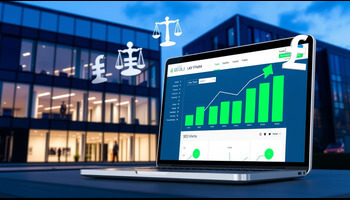7 Dirty Black Hat SEO Techniques to Avoid
Optimising your law firm’s website for search engines requires three things: hard work, consistency and patience. However, there are a lot of so-called “SEO experts” out there who will promise you fast results via shady tactics. We’re talking about black hat SEO techniques.
These are SEO strategies that go against Google’s guidelines and can get your firm’s website penalised or even banned from the search engine altogether.
White hat SEO, on the other hand, is optimising your website in accordance with Google’s rules. Think of it as playing fair.
Although black hat SEO tricks may result in some short-term gains, they do a lot of damage in the long run.
Google’s algorithm is constantly evolving. It gets smarter by the day. After all, Google is the world’s number one search engine for a good reason: because it knows how to find what its users want.
Therefore, trying to manipulate these search results is a dangerous game. You can’t trick Google – at least, not for long. Sooner or later, you will get caught and when that happens, all of your progress will come undone.
If you want more traffic, more cases and more clients, then white hat SEO is the only way to go.
With that in mind, our team at Kinetic Traffic has compiled some of the most common black hat SEO techniques so that you know what to avoid when optimising your law firm’s website.
Contents
#1 – Keyword Stuffing
This is a very old black hat trick, and yet you would be surprised by just how many people still try it.
Keyword stuffing is the act of filling your website’s content with an excessive amount of keywords in order to try and trick Google into thinking that your site is the most relevant result for a particular query.
The problem with this is that it makes your content difficult to read, and thus of little value to users. Google exists to satisfy user intent, so if your content is not valuable to humans in any way, then Google will penalise you for it.
Besides, when you run a quality law firm, you need to have quality copy that accurately reflects the work that you do. Shoddy, over-optimised text will have prospective clients running in the other direction.
#2 – Invisible Text and/or Links
This is another old black hat tactic that many people still believe they can get away with.
Invisible text and links are exactly what they sound like: text or links that are the same colour as the background of your website, making them invisible to users but still readable by search engine crawlers.
The idea behind this technique is to stuff your website with keywords or links in the hopes that Google will pick up on them and give your site a boost in the rankings.
However, this technique is easily detectable by Google and will result in a severe penalty if you’re caught doing it.
Trust us: it’s not worth the risk.
#3 – Doorway Pages
Doorway pages are designed to funnel users from a search engine result page to a particular landing page on your website.
They are often created by stuffing a page with keywords and links in an attempt to manipulate Google’s algorithm and improve your site’s ranking for certain queries.
These pages then use cloaking to send visitors to a different page than the one they originally landed on.
Doorway pages are considered to be black hat SEO because they are created solely for the purpose of manipulating Google’s algorithm.
They offer no value to users – in fact, they are frustrating and create a negative experience.
As a result, you will be severely penalised if you’re caught using them.
Doorway pages are a waste of time and effort for both you and your prospective clients. You want them to be able to find what they’re looking for quickly and easily, not send them down a rabbit hole. Even if doorway pages do lead to a temporary spike in traffic, they’re unlikely to result in more enquiries and cases for your firm.
If you want to improve your website’s ranking, you need to focus on creating high-quality content that is relevant to your target audience and their queries.
Google will reward you for it in the long run.
#4 – Link Swaps
Receiving links to your website is a powerful way of building your domain authority and proving to Google that yours is a trustworthy, authoritative and valuable website.
However, there is a right way and a wrong way to go about it.
Link swaps are when two website owners agree to link to each other’s site in order to improve their own ranking.
On the surface, this might seem like a good idea but it’s actually a black hat SEO tactic that does more harm than good.
The reason for this is because link swaps are often done without any regard for relevancy, which means they provide little to no value to users.
They are also easily detectable by Google and will result in a penalty if you’re caught doing them. Google became wise to this tactic long ago and now places far more value on one-way links rather than reciprocal ones.
For this reason, it’s important to build links organically and only link to websites that are relevant to your own. As a law firm owner, the chances are you have no business linking to a niche pottery blog!
#5 – Duplicate Content
Duplicate content is when you have identical or very similar versions of the same piece of content on your website.
Not only does duplicate content offer little value to users, it also confuses search engine crawlers and makes it difficult for them to determine which version of your content is the most relevant.
As a result, your website’s ranking is likely to suffer.
Let’s say your firm specialises in employment law and you serve both Edinburgh and Glasgow. You would need to create a separate page for each city, each with its own original copy and images. Don’t be tempted to copy and paste to save time.
#6 – Article Spinning
Following on from the last point, don’t be tempted to engage in article spinning to save time, either.
Article spinning is when you take a piece of content and use an AI tool to rewrite it in an attempt to avoid duplicate content penalties whilst saving time.
The problem with this is that it often results in low-quality, unreadable content that offers little value to users.
It’s also easily detectable by Google and will result in a penalty if you’re caught doing it.
#7 – Focusing on Popular Keywords Over Relevant Ones
Last but not least, don’t make the mistake of choosing popular keywords over relevant ones in an attempt to get more traffic.
An example of this might be using keywords relating to personal injury law, when your firm exclusively focuses on environmental law.
If your content isn’t relevant to the keyword you’re targeting, users will quickly bounce off your website. A high bounce rate means that you won’t get the leads and enquiries you’re looking for, and it alerts Google to the fact that something is wrong. Therefore, you may soon find yourself in the dreaded Google jail.
It’s far better to focus on long-tail, relevant keywords that are less popular but will result in higher quality traffic.
Take the time to do your keyword research and only use keywords and phrases that are genuinely relevant to your business, products and services.
If you do, you’ll be rewarded with more targeted traffic and a lower bounce rate in the long run.
Final Thoughts
Ironically, the golden rule of SEO is to focus on creating the best possible content and experience for your target audience, rather than gaming Google’s algorithm.
However, you need a strong knowledge of SEO in order to be able to do this effectively and achieve maximum results.
Black hat SEO tricks lead to a poor user experience and harm your site’s ranking, or may even cause you to be removed from Google’s index altogether.
If you invest in quality, white hat SEO and take the time to do it right, you will be rewarded with higher rankings and more traffic in the long run.
It’s certainly not a quick fix, but it’s the only way to build a sustainable, long-term SEO strategy that will help you grow your law firm and keep the cases coming in.
If you’re ready to use SEO to put your law firm on the map, get in touch with us at Kinetic Traffic to find out more about how we can help.
Lead your law firm towards the best results.
Get in touch with our team and let’s talk about your marketing needs.










